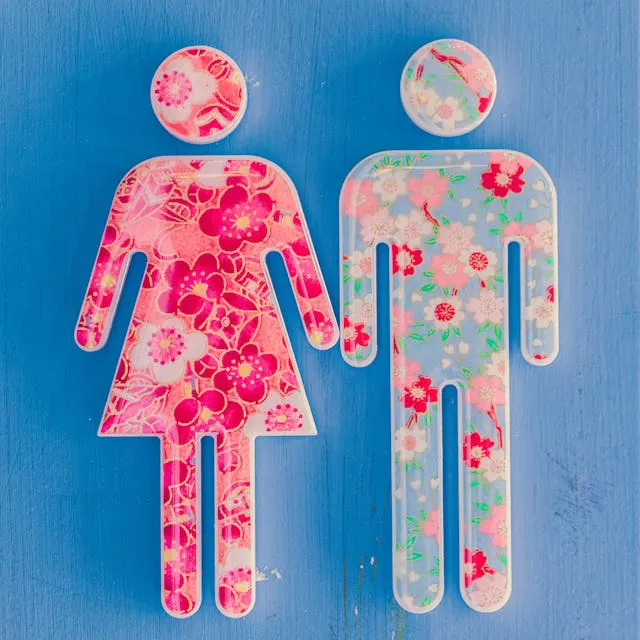Thriving relationships aren’t built on stereotypes, but on understanding.
Guys are logical, girls are emotional.

Guys need their space, girls need to be close.
These are clear-cut obvious differences, deeply rooted in biology, right? Not so fast.
We can blame John Gray author of Men Are From Mars, Women Are From Venus a little bit. Obviously, it’s not entirely his fault, but back in the 1900’s he said things like, “Men and women differ in all areas of their lives. Not only do men and women communicate differently but they think, feel, perceive, react, respond, love, need, and appreciate differently. They almost seem to be from different planets, speaking different languages and needing different nourishment.”
And wow, those ideas were sticky. Thinking men and women are so different that they could metaphorically be from different planets seems relatively harmless, and even kinda silly. Except that a Men vs. Women mentality starts shaping how you think, feel, perceive, respond, and love toward someone of the opposite sex. When you’re in a relationship with someone of the opposite sex you can run into big issues.
The reality is, our thoughts about men and women are often wrong.
Men and Women are Different in Their Romantic Beliefs
“I love you.”
Who is more likely to say that first in a relationship, men or women? This feels like an easy question. Research participants thought so too (Harrison & Shortall, 2011). Nearly 9 out of 10 (87.78%) answered thinking women fell in love more easily, while 3 out of 4 (75.20%) believed women were the first to proclaim their love. Those are big numbers. It’s tough to get that many people to agree about anything. Then again, it feels obvious.
But were all of those people right?
The researchers tested to see if they were correct by asking lots of people how quickly they fell in love and whether they were first to say “I love you.” Let the myth-busting begin. The reality was that men fell in love quicker (and by a large margin), and were also more likely to say “I love you” first (64% of the time).
A separate study also found that men were more likely to believe that love conquers all, and that being in love is all that it takes to have a good relationship (Sprecher & Metts, 1989). Women? Nope, they were realists, as well as much more pragmatic and practical. Love is great, but women tend to have questions like: Does he do drugs? Does he have a job? Does he have a good personality? To me, women’s approach sounds awfully rational and logical. Men’s “love conquers all” mentality sounds emotional. Yet, prevailing “wisdom” is that it’s the other way around.
Men and Women are Different, But It Often Doesn’t Matter
I’m sure you can think of areas where there are clear and obvious differences between men and women. You’re not wrong. Those exist. When you compare men and women on things like height, weight, arm size, shoulder span, and overall body shape, the differences are unmistakable. Similarly, research finds big differences for how people spend their free time (Carothers & Reis, 2013). Men prefer activities such as playing video games, golf, and boxing, while women prefer scrapbooking, watching talk shows, and cosmetics (e.g., hair styling, makeup etc.). Of course, none of these differences meaningfully impact relationship quality.
Know what does impact relationships? Psychological variables like personality. The seminal meta-analysis (a statistical technique that combines findings from lots of individual studies) on gender differences found support for the gender similarities hypotheses, or essentially that “…males and females are alike on most—but not all—psychological variables” (Hyde, 2005). A separate review found more of the same: little or no gender differences in areas such as math and verbal skills, self-esteem, conscientiousness, leadership effectiveness, relational aggression, and attitudes about extramarital sex (Hyde, 2014).
If you thought meta-analyses were impressive (and you should), a meta-synthesis combines groups of meta-analyses. Very meta-meta. A meta-synthesis of 100 meta-analyses examining 400 possible gender differences found that 85% of gender difference effects were small or very small (Zell et al., 2015). Welcome to Earth everyone.
One clarification. Yes, when they say “small” or “very small” differences, those are still real differences. However, just because a difference is real and didn’t happen by chance, it doesn’t tell us if the difference is big enough to be meaningful in everyday life. That is, two things can be different, yet the difference isn’t very big at all. Vanilla and French Vanilla ice cream are different, but are they hugely or meaningfully different? Not really. So if a study finds women average 6.88 out of 7 on verbal ability, but men score 6.25, they’re technically different. Will you be able to detect differences that small in a conversation? Highly unlikely.
I could keep going and share even more evidence of gender similarity (trust me, there’s LOTS), but I’ll stop there. The bigger issue is how these beliefs shape your relationships and undermine intimacy.
Why Your Gender Beliefs Destroy Intimacy
First the facts. When researchers analyzed over 13,000 people across 100+ traits that impact relationships, they concluded that “it is untrue that men and women think about their relationships in qualitatively different ways” (Carothers & Reis, 2013).
Men and women are similar. That’s great news, but almost no one believes it.
Instead people insist on the mythical notion of huge gender differences. It’s not a harmless belief and it creates 3 key issues that corrode connection.
1) The Tyranny of Low Expectations
Imagine two common beliefs: “Women are overly sensitive.” “Men are awful communicators.” (Gendered beliefs are rarely flattering.)
These types of beliefs create a tyranny of low expectations. Sounds menacing, and it is.
Here’s how it works:
- You expect negative gender-related behaviors and undesirable qualities.
- You expect your partner to do those things.
- When they do, you’re not surprised. It’s expected and “just how it is.”
- You tolerate because what choice do you have?
- Ultimately you get stuck tolerating relationship behaviors that are far from ideal.
The tyranny of low expectations is the equivalent of giving our partner a bad reputation to live down to. When you have a bad starting point for what you anticipate from your partner, what are the chances that your relationship reaches its fullest potential? Low. Just like your expectations.
When you expect worst, you get the worst.
2) You’re Stuck: The “All Men” and “All Women” Problem
Too much faith in inescapable differences also encourages complacency.
Really, it’s an excuse. When you think all men and women are the same, there’s only so much you can be responsible for your own behavior. “It’s not me, I’m just a dude. This is how we are.” This type of “boys will be boys” and “she’s such a girl” mentality discourages everyone from being their best self.
To be fair, you probably not doing any of this intentionally. But after decades of socialization, you can’t help but learn a thing or two about how men and women are in relationships. Maybe guys really are always emotionally unavailable, and women are always clingy and dramatic.
Because it’s about gender, any trait feels like a fundamental quality that’s baked in. The result is that change feels nearly impossible. Not only can your individual partner not change, but all men and women feel the exact same. So why bother switching partners? You’re stuck.
3) Differences Create Distance
If there were a golden rule for attraction it would be that we like other people who are similar to us. We enjoy spending time with people who are just like us in terms of their traits, values, how they see the world, hobbies, interests, etc.. Just look at your best friend. You’re a lot alike, and that’s not an accident.
Shared values and interests make spending time together more enjoyable. If we both like going to beach, we can both enjoy it…certainly a lot more than if one of us hates it.
Believing your partner is fundamentally different creates distance between you. They’re harder to get close to and less enjoyable to spend time with.
If you look for differences you’ll find them.
But if you look for similarities, you’ll find those too.
There’s gender similarities and gender differences. Both exist. So why not focus on what you have in common? Instead of being adversaries, you’re teammates. Trade in your archrival for an ally.
What’s the Better Way to Think about Gender Differences?
I’m a social psychologist which means I like to think about the broader social context and how the situation shapes our thoughts and behaviors (e.g., you don’t act the same when you’re with your friends as you do when you’re with your parents).
Women tend to be pickier when selecting a partner (Todd et al., 2007). But is that because that’s just how women are, or is it the situation?
The problem is that the traditional dating situation has very clear power dynamics. In fact, it’s one of the few instances where women have all the power. Men must take the initiative to approach women. In this context, men must work up the courage to introduce themselves and risk rejection. Women simply need to choose: accept or reject. When you have the power, you’re going to make sure you get what’s best for you, so women are often more selective. When you don’t have power, you need to take what the powerful are willing to give. That’s why men are generally less picky.
Curious about this dynamic, researchers wanted to flip the dating script (Finkel & Eastwick, 2009). They tested what I call the “Sadie Hawkins Effect,” or what happens when women need to be the relationship initiator.
Using data from over 300 people at a speed-dating event where participants have a series of quick meet and greets with potential partners. Half of the time, the male participants circulated as women stayed seated (i.e., the standard dating script). The other half of the time, men stayed in one place while women circulated around the room, Sadie Hawkins-style.
The results showed that participants who circulated around the room and made the approach were less picky, regardless of gender. People aren’t out there robotically acting based on whether they’re a guy or a girl. Instead, it varies based on the situation.
This gives us something absolutely crucial: hope. Change is possible. Gender isn’t destiny.
Using purely gender-based explanations locks in our partner’s behaviors because them being a male or female is unlikely to change. Consequently, if we think guys aren’t very thoughtful, assuming our male partner will always be a guy, there is very little hope for improvement. However, if we instead focus on his thoughtfulness as a purely psychological variable, all of a sudden there is path for improvement. Anyone can become more thoughtful with a bit of effort and practice. Those improvements will help relationships. Changing stereotypical beliefs about gender will help too (Lucier et al., 2012).
Conclusion
When we let go of the myth that men and women are from different planets, we make space for something better: true partnership. The reality is that we’re far more alike than we’ve been led to believe, and that similarity is a powerful foundation for love. The truth is, thriving relationships aren’t built on stereotypes, but on understanding, effort, and common ground.

Professor of Psychology at Monmouth University


Leave a Reply